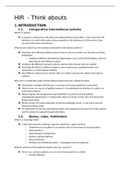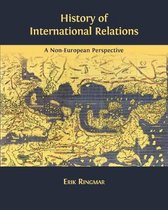HIR - Think abouts
1.INTRODUCTION
1.1. Comparative international systems
What is a system?
A system is composed of units that work independently of each other, at the same time the
behaviour of a unit in the system always depends on the behaviour of all the others, they
are part of the same environment.
What do you study if you are studying 'comparative international systems'?
Examinate how different political systems interact with one another and the effects of these
interactions
o Looking at different international organizations, such as the United Nations, and how
they interact with different nations.
Looking at the different economic systems and how they interact with one another
Examining the effects of different regimes, such as democracy, authoritarianism, and
communism, on international relations
How different cultural norms interact with one another and how this affects international
relations
Why must a comparative study of international systems become a historical study?
The present is charged with the past (= because of the past people live so precisely)
History serves as a source of political memory (= to understand our identity of a nation, we
must look to history)
History exposes the fundamental unpredictability of current social and political
arrangements/agreements. (= it shows that what is currently normal, all is not natural and
history shows that)
History reveals the context specificity of literate knowledge claims. (= one claims that one
knows how things work)
Today there is only one international system that originated in Europe in the 16th century
and this system has spread through colonialism.
1.2. Norms, rules, institutions
What is a "sovereign state?
A state that exercises authority/ supreme authority in a given territory.
o Determines its own affairs in accordance with its own interests and aspirations.
o Social practices
o Administrative arrangements
o Borders, national anthems
o Rules and norms
o All states are functionally equal -> sovereignty must be respected.
What do scholars of international relations mean by "anarchy"?
There is no common authority, no one cares for the system as a whole.
o Security dilemma
, o Different institutions, rules and norms
o Territory is often defined differently
o Borders have different meanings
o Some political entities are completely independent, others not so much.
o Different political entities are not functionally equal.
What can a study of non-European international systems tell us about Europe?
Tells us that Europe is not as unique or special as it likes to think
Europe's international system is not fundamentally different from other international
systems in the world, and that it is not the only region to be affected by globalisation,
modernity, and the decline of the nation-state.
A study of non-European international systems can provide valuable insight into European
systems.
Can help Europeans to understand the nature of the challenges they face in the 21st century
1.3. Stateless societies
What are 'stateless societies'?
Nomads were constantly on the move and this made it difficult for political authorities to
exercise control over them.
Social systems that lack a central government
Decentralized networks of power, with individuals and small groups having the freedom to
make decisions and act independently of larger governing bodies
Describe the lifestyle of hunters and gatherers
They only had temporary buildings, no settlement Flexibility, mobility and immediacy
They 'have no history' because they have few ruins
Later: sedentary people
Could acquire a culture and language
More varied diet
Less exposed to infectious diseases
More egalitarian
Why was pastoralism until recently a successful form of social and economic organization?
Successful form of social and economic organization until recently because it was a highly
adaptable form of production that allowed people to live off the land without having to
invest a great deal of labour or resources into it.
Pastoralism also allowed people to travel and migrate to different areas, which allowed them
to access new resources and trading opportunities.
Resilient to environmental shocks, meaning that it could survive through periods of drought,
floods, and other natural disasters.
Able to provide a high degree of economic security for its practitioners.
1.4. Walls and bridges
What is culture?
Refers to cultivation, to protect what we grow, we drive poles into the ground and build
fences that separate what is ours from what is other people's.
, the sum of all the practices, beliefs, values, customs and knowledge that a group of people
share, as well as the material objects created by those people.
Ongoing evolution, as members create new ideas, values, and practices
Culture can be seen as a way of organizing social life, a means of creating meaning, and a
form of collective identity.
What is "civilization? How do civilizations spread?
The stage of human social and cultural development and organization that is considered
most advanced.
Spread:
o Society is connected to other societies people are connected to other people
o Choice between better and cheaper options, we can choose new things because we
compare
o Depends on circulation of goods, people, ideas, beliefs and lifestyles.
o Provides a means of escape when we are given alternatives, we give up our old
ways.
Why have many societies decided to construct walls around themselves?
Some international systems decide to surround themselves with walls. This provided limited
interaction with the rest of the world (e.g., international system of America, Japan in the
17th-19th century)





